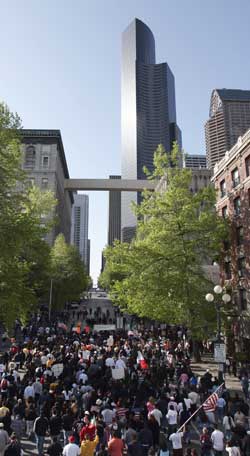In recent days, two major protests addressed issues alarming to tens of millions of Americans. One was effective. One wasn’t.
In New York Saturday, April 29, nine “initiating groups”—notably United for Peace and Justice (UFPJ), NOW, and Friends of the Earth—sponsored a national antiwar march and rally. The demands: “End the war in Iraq. . . . No war on Iran! Stand up for immigrant and women’s rights!” Since Iraq was invaded, several such demonstrations have drawn 50,000 to 250,000 people. The impact has been negligible, as has been media coverage. The same is true for recent mass antiwar protests here in Seattle.
Monday, May 1, was completely different. Across America, millions clogged streets for a “National Day of Action for Comprehensive Immigration Reform,” including a bigger crowd in Seattle than the similar protest a few weeks ago. In only six weeks, these protests have changed congressional debate over immigration reform. It’s a political earthquake for both parties. It’s also a huge cultural phenomenon, revealing immigrants as an integral part of our economy and our country.
Far more people in the U.S. oppose the war in Iraq than are non-native-born residents. Neither cause has many champions in D.C. So why has one movement been wildly successful and the other a flop?
At one level, it’s simple. Many immigrants, legal or otherwise, are marching for their lives. Bush critics don’t have that urgency. We read the latest, swear or sigh, and go about our lives. That’s the biggest difference.
But there are plenty of other factors. War opponents, a majority of the country, don’t have the media infrastructure that immigrants have. Here and elsewhere, Spanish language radio has helped turn out huge numbers on short notice. The liberal blogosphere or Air America can’t do that.
In mainstream media, antiwar protesters aren’t taken seriously. The sponsors and rallying cries have been solidly leftist, sometimes extremely so. Each sponsor Saturday, save perhaps the Climate Crisis Coalition (huh?), is progressive. Turnout hasn’t met expectations, especially after huge pre-Iraq-invasion protests. Only Cindy Sheehan’s Crawford, Texas, protest last summer has been imaginative or generated buzz or momentum. Democratic Party leaders haven’t taken these events seriously. So networks and big dailies yawn, and people upset about Iraq not only don’t know about the protests but often don’t share organizers’ political sensibilities.
Protesting Iraq and a hodgepodge of other pet liberal causes doesn’t get to the heart of what’s alarming many people—an unaccountable and wildly unpopular administration—let alone offer hope. The focus is usually negative, critical of policy, a venting of frustration born of perceived powerlessness.
By contrast, the immigrant marches by a far-less-powerful constituency are inspiring, because these people love this country. Flags are everywhere. Marchers want to be here. They chose to come here—sometimes at great risk, sometimes giving up everything. They want a chance to be part of this country. They believe in the promise of America.
That, not litanies of criticism, should be the focus of anti-Bush mobilization. It must be positive, hopeful, insistent. Our country is being stolen. We demand it back. We love our country, and we’re not about to idly watch Machiavellian oil-patch executives wreck it. That’s the message.
In the immigration-reform debate, immigrants loving America completely reframed the issue. For months, Congress debated two proposals, one a business-friendly plan that exploited immigrants, the other a xenophobic nightmare that would have built a big wall and turned illegals and their allies into felons. Suddenly, those policies’ victims became human, became sympathetic, became patriotic. The false policy dichotomy was destroyed.
Antiwar activists have lots of political leverage in this election year, despite Dubya’s idiotic pledge to leave Iraq a mess for the next president to solve, despite his insane interest in attacking, and maybe nuking, Iran. Campaigning legislators like U.S. Sen. Maria Cantwell, D-Wash., are feeling heat over Iraq. Republicans, terrified of losing one or both chambers, are anxiously separating themselves from Bush. Neither Democrats nor Republicans have been forced to decide whether they support a military strike on Iran.
A popular mobilization focused on those issues could work wonders. It would require that ordinary opponents of the war(s) feel that they can make a difference. It would also require nonideological messages that appeal to the ideals and common sense of not only lefties but the much vaster range of liberals, independents, even conservatives appalled by Bush’s misuse of our military. And it needs newer, creative approaches, more galvanizing than the same tired chants and speakers.
It can be done, here and across the country. Memorial Day would be a fine time to start. July Fourth is next. The numbers and passion are here. Can we be galvanizing, creative, inspiring, effective?
Much less likely things have happened. Ask the immigrants.







